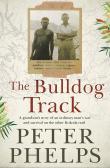 8667006958968658721.jpg
8667006958968658721.jpg
 The Bulldog Track : A Grandson's Story of an Ordinary Man's War and Survival on the Other Kokoda Trail
single work
The Bulldog Track : A Grandson's Story of an Ordinary Man's War and Survival on the Other Kokoda Trail
single work
 8667006958968658721.jpg
8667006958968658721.jpg
 The Bulldog Track : A Grandson's Story of an Ordinary Man's War and Survival on the Other Kokoda Trail
single work
The Bulldog Track : A Grandson's Story of an Ordinary Man's War and Survival on the Other Kokoda Trail
single work
"March 1942: The world is at war. Tom Phelps found work as a carpenter in the goldfields of the New Guinea Highlands. No one expected the Japanese to invade the Pacific, let alone take the northern cities of New Guinea.
"As word of the invasion spread, Tom and his fellow workers were caught in the middle of it all. After the airfield was bombed, the Australian military told them to get out via the ‘other’ Kokoda Track. Kukuku hunters and Ghurka allies would let them pass but did not do the same for the pursuing Japanese soldiers.
"Back home in Sydney, his family were told that Tom had died. Travelling by foot, canoe, raft, schooner, train, luck and cunning, Tom Phelps eventually made it home, half-starved, suffering malaria and wearing the pith helmet he kept with him the whole way.
"The escape was documented on Tom’s helmet in indelible ink. Seventy-five years later, it sat next to his grandson Peter as he wrote this book."
Source: Publisher's blurb.
'Described as 'a bloody good yarn' by Phelps' mother, this memoir is a loving tribute to Phelps' father and grandfather.'
'Described as 'a bloody good yarn' by Phelps' mother, this memoir is a loving tribute to Phelps' father and grandfather.'